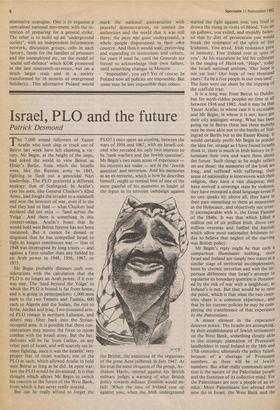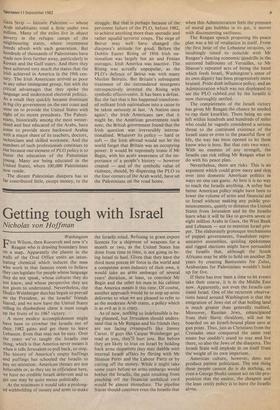Israel, PLO and the future
Patrick Desmond
The 7,000 armed followers of Yasser Arafat who took ship or truck out of Beirut last week have left claiming a vic- tory. Mr Begin, at the height of the siege, had asked the world to view Beirut as Hitler's Berlin, from which the Israelis were, like the Russian army in 1945, fighting to flush out a genocidal Nazi leadership. The PLO preferred a different analogy: that of Stalingrad. In Arafat's eyes his men, like General Chuikov's 62nd Army, had fought the invader to a standstill and won the honours of war, even if in the end they had to find — what Chuikov had declared did not exist — 'land across the Volga'. And there is something in this counter-image. Arafat's boast that he would hold west Beirut forever has not been sustained. But it cannot be denied or disguised that he has compelled Israel to fight its longest continuous war.— that of 1948 was interrupted by long truces — and against a force smaller than any fielded by an Arab power in 1948, 1956, 1967, or 1973.
Mr Begin probably dimisses such con- siderations with the calculation that the PLO is no longer an Arab power, if it ever was one. The 'land beyond the Volga' to which the PLO is bound is far from home, and it is going in pennypackets: 1,000 men each to the two Yemens and Tunisia, 600 each to Algeria and the Sudan, the rest to Syria, Jordan and Iraq. Two thousand arm- ed PLO remain in northern Lebanon, and others may filter back into the Syrian- occupied area. It is possible that these con- centrations may muster the force to rejoin combat with the Israeli army. But the bat- tlefronts will be far from Galilee, or any other part of Israel, and will scarcely see in- tense fighting, since it was the Israelis' very proper fear of street warfare, not of the PLO as such, which allowed Arafat to hold west Beirut as long as he did. In open war- fare the PLO would be devastated. It is that thought which allows Mr Begin to switch his concern to the future of the West Bank, from which it has never really strayed.
But can he really afford to forget the PLO? I once spent an evening, between the wars of 1956 and 1967, with an Israeli col- onel who revealed his only two interests to be 'tank warfare and the Jewish question'. Mr Begin's two main areas of experience his interests are wider — are in the 'Jewish question' and terrorism. And his memories as an ex-terrorist, which is how he describes himself, ought to remind him of one of the most painful of his moments as leader of the lrgun in its terrorist campaign against the British, the execution of the organisers of the great Acre jailbreak in July 1947. At his trial the most eloquent of the group, Av- shalom Haviv, uttered against his British military judges a warning of what British policy towards militant Zionism would en- tail: 'When the sons of Ireland rose up against you, when the Irish underground
started the fight against you, you tried to drown the rising in rivers of blood. You set up gallows, you exiled, and stupidly believ- ed that by dint of persecution you would break the resistance of the spirit of free Irishmen. You erred. Irish resistance grew in intensity. Free Ireland rose in spite of you'. At his execution he led his cellmates in the singing of Hatikvah, 'Hope', today the Israeli national anthem, 'Our hope is not yet lost/ Our hope of two thousand years/ To be a free peoplr, in our own land'. The lines were cut short by the tripping of the scaffold trap.
It is a long way from Beirut to Dublin, but for myth-ridden peoples no time at all between 1916 and 1982. And it may be that Yasser Arafat, in whose case it is excusable and Mr Begin, in whose it is not, have got their city analogies wrong. What has been going on in Beirut these last three months may be most akin not to the battles of Stal- ingrad or Berlin but to the Easter Rising. It would certainly profit Mr Begin to ponder the idea for, strange as I have found Israelis think it, there is much in Irish history to il- luminate their own and warn them about the future. Such things as he might reflect on are these: the memories of the Irish are long, and suffused with suffering; their sense of nationality is interwoven with their religion, they have a vast diaspora; they have revived a sovereign state by violence, they have recreated a dead language (even if i no one speaks it); above all, they have n their past something to them as monstrous as the Holocaust, and objectively not utter- ly incomparable with it, the Great Famine of the 1840s. It was that which killed a million out of six million Irish, drove two million overseas and fuelled the hatreds which allow most nationalist Irishmen to- day to believe that neglect of the starving was British policy.
Mr Begin's reply might be that such a comparison illuminates nothing, since Israel and Ireland are simply two states at a similar stage of territorial incompleteness, beset by chronic terrorism and with the im- portant difference that Israel's attempt to regularise its boundary question is threaten- ed by the risk of war with a neighbour, as Ireland's is not. But that would be to miss the point, which is that what the two coun- tries share is a common experience, and that by his current policies he may be com- pleting the transference of that experience to the Palestinians.
A minor element in the experience deserves notice. The Israelis are attempting, by their establishment of Jewish settlements on the West Bank, something closely akin to the strategic plantation of Protestant landholders in rural Ireland in the 16th and 17th centuries; ultimately the policy failed, because of a shortage of Protestant numbers, as there will be of Jewish numbers. But what really commands atten- tion is the nature of the Palestinian people and the furniture of its collective mind. For the Palestinians are now a people of an ex- odus. More Palestinians live abroad than now do in Israel, the West Bank and the Gaza Strip — historic Palestine — whose Arab inhabitants total a little under two million. Many of the exiles live in abject Poverty in the refugee camps of the neighbouring states, where resentment breeds afresh with each generation. But hundreds of thousands of Palestinians have made new lives further away, particularly in Kuwait and the Gulf states. And there they have achieved very much the status that the Irish achieved in America in the 19th cen- tury. The Irish Americans arrived as poor as any other immigrant group, but with the critical advantages that they spoke the language and understood electoral politics. As a result they quickly became dominant In big city government on the east coast and went on to provide the United States with eight of its recent presidents. The Palesti- nians, historically among the most wester- nised and best educated of the Arabs, have come to provide more backward Arabia with a major share of its teachers, doctors, technicians and skilled workmen. And the numbers of such professionals continues to rise because one element of PLO policy is to foster the education of the Palestinian Young. Many are being educated in the United States, where 100,000 Palestinians now reside.
The distant Palestinian diaspora has so far contributed little, except money, to the struggle. But that is perhaps because of the persistent failure of the PLO, before 1982, to achieve anything more than sporadic and rather squalid terrorist coups. The siege of Beirut may well have changed the diaspora's attitude for good. Before the Dublin Easter Rising of 1916 Irish na- tionalism was largely hot air and Fenian outrages. Irish America was inactive. The Rising was actually unpopular, as the PLO's defence of Beirut was with many Muslim Beirutis. But Britain's subsequent treatment of the surrendered insurgents retrospectively invested the Rising with symbolic effectiveness. It has been a defeat. But the fact that it has happened transform- ed militant Irish nationalism into a cause to be taken seriously at last. 'A Nation once again'; the Irish Americans saw that it might be, the American government took note, the British government found that the Irish question was irreversibly interna- tionalised. Whatever its policy — hard or soft — the Irish abroad would not let the world forget that Britain was an occupying power. It would be supremely ironic if Mr Begin, with his acute awareness of the im- portance of a people's history — however created — and of the symbolic value of violence, should, by dispersing the PLO to the four corners of the Arab world, have set the Palestinians on the road home.



































 Previous page
Previous page